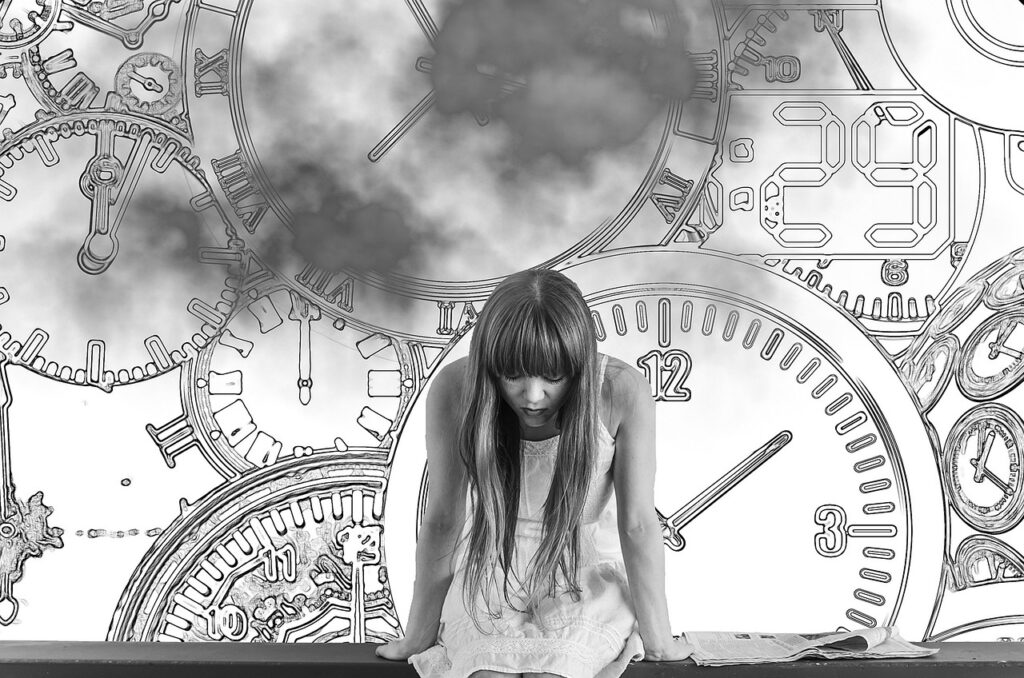The clocks would never align. Judith had known this since the time her father deemed her old enough to understand. She had been too young to question it, and besides, time wasn’t relevant when your day cycled through waking, breakfast, lessons, lunch, playing, dinner, bath time, story time and bed …

She had also been too young to question why most – not all – her bedtime stories centred around time in some form. Time in the past, time in the future, time which flowed quickly, and time which went by more slowly than the day before Christmas. But never time in the present.
One evening, after learning about past, present and future tenses at the village school, Judith asked her father about this. He laid down the book he was reading and closed its covers, using a long finger to keep the place.
‘Because there is no such thing as present time,’ he told Judith.
‘But right now, here, is the present,’ she argued. ‘You reading, me talking to you.’
Father shook his head. ‘But I have done those things, they are in the past. They have happened, and we move forward into the future.’
‘Then …’ Judith tilted her head to the side and thought hard. ‘Everything is in the past?’
‘Yes. But there’s more than that.’ Father put the book on the low table and walked to the window, drawing open the curtain. ‘You see them every day, the clocks,’ he said, pointing through the glass at the great wall of clocks which rose up on the far side of the square.
It was Father’s job to care for the clocks, and especially, to add a new clock each time a baby was born in the village, and remove one with each death.
‘The clocks that will never align,’ Judith said, remembering.
‘Exactly.’ Father let the curtain drop. ‘I believe you are of an age where you can understand why.’
Judith waited, curious. Why wouldn’t the clocks align?
Father sat again on the couch. ‘Every one of us lives to a different beat, Judith. Your time is not my time. When time flies for you, it will creep along like an arthritic snail for someone else. Or pass pleasantly, unconsidered, for another.’ He smiled. ‘Do you see?’
Judith nodded. It was so simple, and of course, when Father explained it like that, it was obvious the clocks would never align. But they were always moving forward, into the future, whatever their pace. She understood that too.
Follow the daily writing prompt on Facebook.
Find Cheryl’s flash fiction and short stories, including audio versions of some, here!
A fascinating interpretation of the currency of time.
Here’s mine – for what it’s worth!
PICTURE – YOUNG GIRL WITH CLOCKS IN BACKGROUND
Rachael had tried her best to fulfil the brief.
Paint clocks, they had said. It’s time to brighten the walls of the Town Hall.
A young artist full of promise, Rachael had won a local competition to find a suitable painter to illustrate a large public space.
It wasn’t until they briefed her that she found out the Town Hall was the venue and the council was determined to have clocks as the picture’s main theme.
Rachael found this edict somewhat disturbing. The Town Hall already had a clock. Part of its original construction, the timepiece had long struck its chimes without fail on the quarter hour for many years – the peels echoing musically across the city so passers-by could set their watches if needed with confidence.
Now, here Rachael was, high on erected scaffolding, paint brush in hand and pots of colours at her feet, trying to gain some perspective.
The first painted clock had not been too difficult. She tried to position it so it would augment the real clock higher on the wall without detracting from either creation.
An extraordinarily perceptive person, Rachael’s brushstrokes quickly turned the blank bluestone wall into a three-dimensional blaze of colours with numbers marking the quarter hours and hands pointing randomly to the minutes in between.
The second clock proved more problematic and finished up looking more like the face of a rare gold sovereign than a clock face, but by this stage Rachael was in full swing and differently designed clocks were flourishing under her guiding hand.
She had almost finished the project – clocks overlapping one another, some on the surface of a sphere – when the unthinkable happened.
Stepping backwards on the scaffolding, Rachael stumbled, sending paint pots flying and only managing to save herself from plummeting to the ground by grabbing the safety rail.
Totally dismayed, she looked up to see different coloured paints covering several of her clock faces – her creation completely destroyed.
“What am I going to do?” she cried. “How on earth can I fix this?”
Climbing to the ground, Rachael sat on a ledge, shoulders slumped, back to the wall, alongside a discarded newspaper.
She knew she didn’t have the strength to redo the work and wondered if, by some miracle, she could find a way to overcome the damage she had done.
Whoops!